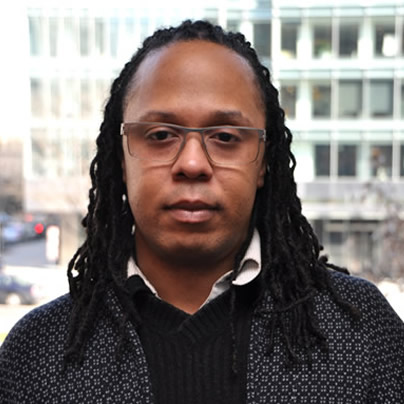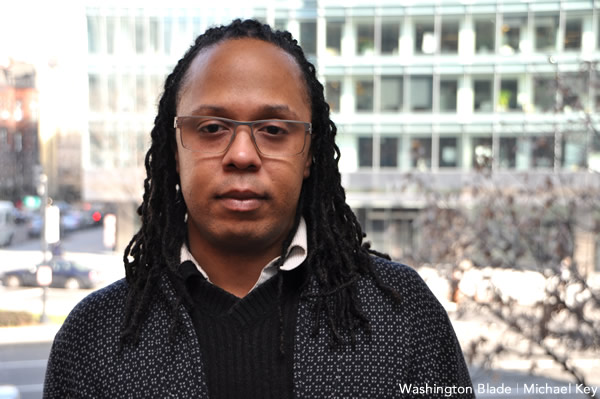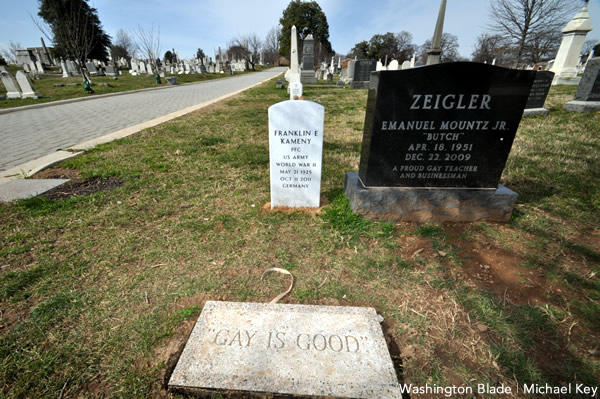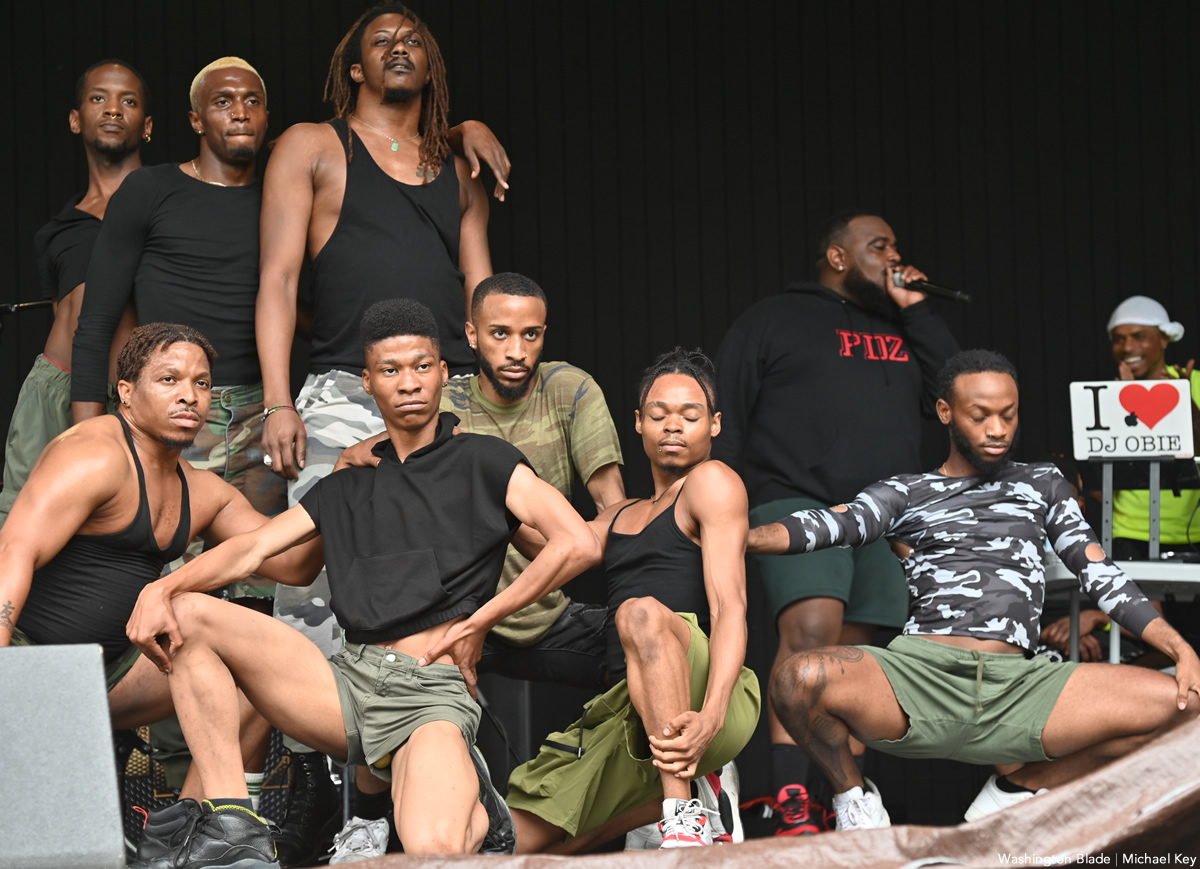Local
In reversal, Kameny heir says no ashes for public memorial
Dramatic shift leaves fate of cemetery plot unclear


Timothy Clark, who earlier said he would release half of Frank Kameny’s ashes to be interred at Congressional Cemetery, changed his mind and now plans to inter the ashes at an undisclosed location. (Washington Blade photo by Michael Key)
Timothy Clark, the man D.C. gay rights pioneer Frank Kameny named in his will as heir to his estate, has released a statement through his lawyers saying he has decided to inter Kameny’s ashes at an undisclosed location.
The statement released Feb. 20 by the D.C. law firm Ackerman Brown represents a dramatic change from Clark’s earlier statements, including comments in an interview with the Blade in 2012, that he would release half of the ashes for burial at a memorial site in the city’s historic Congressional Cemetery. He reiterated his intent to inter ashes in D.C. in another Blade interview in July 2013.
“We reached an agreement on that so I’m going to keep the burial plot,” Clark said at that time. “I just have to decide on when I want to have something,” he said in referring to a burial ceremony at Congressional Cemetery.
Clark, 37, Kameny’s housemate and longtime friend, had said in the months following Kameny’s death on Oct. 11, 2011, that he planned to keep some but not all of the ashes for his personal reflection and possible interment elsewhere. Kameny died in his Washington home of natural causes at the age of 86.
“The decision regarding interment of Frank Kameny’s ashes rests solely with Timothy Clark, the Personal Representative of the Estate of Franklin E. Kameny,” the Ackerman Brown statement says.
“Mr. Clark has decided to inter the ashes at an undisclosed location. Mr. Clark asks the community to respect his wishes and his privacy,” the statement says.
Clark’s announcement through his attorneys comes more than two years after the local LGBT charitable group Helping Our Brothers and Sisters (HOBS) purchased a burial plot for Kameny’s ashes at Congressional Cemetery.
HOBS and some of Kameny’s gay activist friends and supporters who worked with the group to choose the location of the cemetery site said it would become a monument to Kameny’s legacy and a place where people could go to pay their respects to a nationally known figure considered a hero to the LGBT rights cause.
The site they selected is located just behind the gravesite of the late gay rights leader and U.S. Air Force Sgt. Leonard Matlovich, who, with Kameny’s assistance in 1975, became the first active duty military service member to come out of the closet and challenge the military’s ban on gay service members. Matlovich died in 1987.
A planned ceremony and burial of Kameny’s ashes scheduled for March 2012 was abruptly cancelled at the request of the estate, according to Patrick Crowley, who worked as senior manager of Congressional Cemetery at that time. Lawyers for the Kameny estate wanted HOBS to transfer ownership of the cemetery plot to the estate, Crowley said.
Although HOBS agreed to the transfer, a dispute arose over the terms of an agreement proposed by lawyers for both parties, and negotiations dragged on for nearly two years.
Last July, both sides said a tentative agreement had been reached, raising hopes among Kameny’s friends and admirers that a burial ceremony and the official opening of a Kameny memorial site at Congressional Cemetery would soon take place.
“The estate has always been, and remains willing to work with gay community representatives who knew Frank Kameny in organizing a burial service and appropriate gravesite at which members of the community could pay tribute to Kameny,” said attorney Christopher Brown of Ackerman Brown at that time.
However, no announcement of an agreement emerged since that time. When Ackerman Brown released its statement last week saying Clark decided to inter the ashes at an undisclosed location, neither Ackerman Brown nor HOBS would disclose where things stood with the cemetery plot.
“The estate has no further comment,” said Glen Ackerman, principal partner of Ackerman Brown, in a Feb. 23 email to the Blade.
Matthew Cook, an attorney with the national law firm Fried Frank, which is representing HOBS, sent the Blade a separate statement from HOBS that made no mention of whether ownership of the cemetery plot had been transferred to the estate or whether HOBS would seek to set up another memorial site for Kameny at Congressional Cemetery.
“Dr. Kameny was a true gay rights pioneer and local legend,” the HOBS statement says. “HOBS was proud to work with and for Dr. Kameny during the last years of his life. Of course, as the executor of the Kameny Estate, it is Mr. Clark’s decision where to inter Dr. Kameny’s ashes.”
Veteran D.C. gay activist Paul Kuntzler, who worked with Kameny on gay rights activities beginning in 1962, and San Francisco gay activist Michael Bedwell, a friend of Kameny’s, each told the Blade that the LGBT community should now take immediate steps to arrange for another memorial site for Kameny at Congressional Cemetery, even though the ashes won’t be interred there.
The four local activists and Kameny friends who initiated plans to inter Kameny’s ashes at Congressional Cemetery in early 2012 – Marvin Carter, CEO of HOBS and LGBT rights advocates Charles Francis, Bob Witeck and Rick Rosendall – have declined to comment on Clark’s decision to inter the ashes at another location.
They also declined to comment on what, if anything, they may do to set up a Kameny memorial site at the cemetery now that the ashes are out of the picture.
“Frank Kameny’s monumental legacy may be best remembered by laws he helped overturn, the hateful policies he defeated and the causes of equal rights he unselfishly advanced for the LGBT community,” said Witeck in an email statement on Sunday.
The relationship between the four men and the Kameny estate became strained in 2012 shortly after they announced plans for a Congressional Cemetery memorial site and burial when Clark stated through his attorneys that Clark was never given the courtesy of being consulted about those plans.
Carter, however, has said Clark was informed about the plans and invited to participate in the planned ceremony.
The relationship between the four men and the estate became further strained when the estate filed individual lawsuits against each of them, charging that they took without permission items from Kameny’s house that belonged to the estate shortly after Kameny’s death. The men disputed the allegations, saying Clark along with Clark’s lawyer at the time, Michele Zavos, gave them permission to enter the house and take an inventory of Kameny’s papers and other possessions to arrange for their safe keeping.
The lawsuits, which were filed by Ackerman Brown on Clark’s behalf, were later dropped after undisclosed settlements were reached in three of the cases. The court dismissed the case against Rosendall on grounds that no cause was shown to justify the complaint, according to Rosendall’s attorney, Mindy Daniels.
Upon learning of Clark’s decision to inter the ashes in an undisclosed location, Bedwell expressed concern that Clark, who among other things, inherited Kameny’s house that the estate sold in 2012 for $725,000, was not doing his part to promote Kameny’s legacy.
“Frank’s trust and affection made Mr. Clark a wealthy man,” Bedwell said. “His sacrifices helped make him, like all LGBTs, a freer man,” Bedwell said.
“Now that Mr. Clark has disappeared with Frank’s ashes along with any hopes of his repaying Frank’s extraordinary generous friendship by sharing them for a memorial, I trust that others will create one without them,” he said.
Clark didn’t respond to a phone message from the Blade this week.
In a 2012 interview with the Blade, Clark described himself as a private person who shunned the spotlight, saying he intentionally remained in the background during the 19 years he lived in Kameny’s house.

(Washington Blade file photo by Michael Key)
Also remaining unclear this week is what will become of a headstone and separate grave marker that HOBS and the activists working with the group installed at the cemetery site before the dispute with the estate surfaced.
Francis, the founder of the Kameny Papers Project, which arranged several years before Kameny’s death to have Kameny’s voluminous collection of letters and gay rights documents donated to the Library of Congress, obtained the headstone from the U.S. Department of Veterans Affairs.
Francis and others working on the memorial site said the military headstone would recognize Kameny’s role as a World War II combat veteran. The stone is identical to gravestones used for soldiers and veterans buried at Arlington National Cemetery, and is issued free of charge to all deceased military veterans.
HOBS purchased a separate footstone inscribed with the slogan Kameny coined in the 1960s, “Gay is Good.” Carter said HOBS paid for the footstone along with the cemetery plot through funds donated by members of the LGBT community.
HOBS had both stones installed at the gravesite in March 2012 in anticipation that plans for burial of the ashes would move forward as planned.
Cemetery officials later removed the headstone and the “Gay is Good” marker and placed them in storage, saying it was inappropriate for them to remain in place while the ownership of the gravesite was in dispute.
Bedwell, who has played a role in managing the Matlovich gravesite, said he owns a separate plot next to the Matlovich site that he offered to donate for the Kameny burial shortly after Kameny died. HOBS instead chose to buy a plot a short distance away. Now, Bedwell said he is open to donating the plot he owns for a new Kameny memorial site at the cemetery.
“Neither [Clark’s] permission or Frank’s ashes are required for anyone to create a memorial to Frank anywhere,” Bedwell said in a comment to the Blade in October. “Millions more visit Lincoln’s Memorial in Washington every year than his actual gravesite in Springfield, Ill.,” he said.
“I’m confident many would be eager to contribute to the purchase of another marker bearing Frank’s name,” Bedwell said, in the event that the Veterans Administration stone or the “Gay is Good” stone won’t be released by the estate.
Ackerman, while repeating his firm’s written statement that the Kameny estate would have no further comment on Clark’s decision to inter the ashes in a private location, said the estate would welcome inquiries “by anyone” interested in establishing a public memorial for Kameny.
“All they have to do is call us,” he said.
District of Columbia
New D.C. LGBTQ+ bar Crush set to open April 19
An ‘all-inclusive entertainment haven,’ with dance floor, roof deck

D.C.’s newest LGBTQ+ bar called Crush is scheduled to open for business at 4 p.m. on Friday, April 19, in a spacious, two-story building with a dance floor and roof deck at 2007 14th St., N.W. in one of the city’s bustling nightlife areas.
A statement released by co-owners Stephen Rutgers and Mark Rutstein earlier this year says the new bar will provide an atmosphere that blends “nostalgia with contemporary nightlife” in a building that was home to a popular music store and radio supply shop.
Rutgers said the opening comes one day after Crush received final approval of its liquor license that was transferred from the Owl Room, a bar that operated in the same building before closing Dec. 31 of last year. The official opening also comes three days after Crush hosted a pre-opening reception for family, friends, and community members on Tuesday, April 16.
Among those attending, Rutgers said, were officials with several prominent local LGBTQ organizations, including officials with the DC Center for the LGBTQ Community, which is located across the street from Crush in the city’s Reeves Center municipal building. Also attending were Japer Bowles, director of the Mayor’s Office of LGBTQ Affairs, and Salah Czapary, director of the Mayor’s Office of Nightlife and Culture.
Rutgers said Crush plans to hold a grand opening event in a few weeks after he, Rutstein and the bar’s employees become settled into their newly opened operations.
“Step into a venue where inclusivity isn’t just a promise but a vibrant reality,” a statement posted on the Crush website says. “Imagine an all-inclusive entertainment haven where diversity isn’t just celebrated, it’s embraced as the very heartbeat of our venue,” the statement says. “Welcome to a place where love knows no bounds, and the only color or preference that matters is the vibrant tapestry of humanity itself. Welcome to Crush.”
The website says Crush will be open Tuesdays and Wednesdays from 4 p.m. to 12 a.m., Thursdays from 4 p.m. to 2 a.m., Fridays from 4 p.m. to 3 a.m., Saturdays from 2 p.m. to 3 a.m., and Sundays from 2 p.m. to 12 a.m. It will be closed on Mondays.
Crush is located less than two blocks from the U Street Metro station.
District of Columbia
Reenactment of first gay rights picket at White House draws interest of tourists
LGBTQ activists carry signs from historic 1965 protest

About 30 LGBTQ activists formed a circular picket line in front of the White House Wednesday afternoon, April 17, carrying signs calling for an end to discrimination against “homosexuals” in a reenactment of the first gay rights protest at the White House that took place 59 years earlier on April 17, 1965.
Crowds of tourists looked on with interest as the activists walked back and forth in silence in front of the White House fence on Pennsylvania Avenue. Like the 1965 event, several of the men were dressed in suits and ties and the women in dresses in keeping with a 1960s era dress code policy for protests of the Mattachine Society of Washington, D.C., the city’s first gay rights group that organized the 1965 event.
Wednesday’s reenactment was organized by D.C.’s Rainbow History Project, which made it clear that the event was not intended as a protest against President Joe Biden and his administration, which the group praised as a strong supporter of LGBTQ rights.
“I think this was an amazing event,” said Vincent Slatt, the Rainbow History Project official who led efforts to put on the event. “We had twice as many that we had hoped for that came today,” he said.
“It was so great to see a reenactment and so great to see how far we’ve come,” Slatt said. “And also, the acknowledgement of what else we still need to do.”
Slatt said participants in the event who were not carrying picket signs handed out literature explaining the purpose of the event.
A flier handed out by participants noted that among the demands of the protesters at the 1965 event were to end the ban on homosexuals from working in the federal government, an end to the ban on gays serving in the military, an end to the denial of security clearances for gays, and an end of the government’s refusal to meet with the LGBTQ community.
“The other thing that I think is really, really moving is some of the gay staff inside the White House found out this was happening and came out to greet us,” Slatt said. He noted that this highlighted how much has changed since 1965, when then President Lyndon Johnson’s White House refused to respond to a letter sent to Johnson from the Mattachine Society explaining its grievances.
“So now to have gay people in the White House coming out to give us their respects and to say hello was especially meaningful to us,” Slatt said. “That was not expected today.”
Among those walking the picket line was longtime D.C. LGBTQ rights advocate Paul Kuntzler, who is the only known surviving person who was among the White House picketers at the April 1965 event. Kuntzler said he proudly carried a newly printed version of the sign at Wednesday’s reenactment event that he carried during the 1965 protest. It stated, “Fifteen Million Homosexuals Protest Federal Treatment.”
Also participating in the event was Japer Bowles, director of D.C. Mayor Muriel Bowser’s Office of LGBTQ Affairs. Bowles presented Slatt with a proclamation issued by Bowser declaring April 17, 2024, Mattachine Society Day in Washington, D.C.
“Whereas, on April 17, 1965, the Mattachine Society of Washington courageously held the nation’s inaugural picket for gay rights, a seminal moment in the ongoing struggle for LGBTQIA+ equality in the United States, marking the genesis of public demonstrations advocating for those rights and paving the way for Pride Marches and Pride celebrations worldwide,” the proclamation states.
About 30 minutes after the reenactment event began, uniformed Secret Service agents informed Slatt that due to a security issue the picketers would have to move off the sidewalk in front of the White House and resume the picketing across the street on the sidewalk in front of Lafayette Park. When asked by the Washington Blade what the security issue was about, one of the Secret Service officers said he did not have any further details other than that his superiors informed him that the White House sidewalk would have to be temporarily cleared of all people.
Participants in the event quickly resumed their picket line on the sidewalk in front of Lafayette Park for another 30 minutes or so in keeping with the 1965 picketing event, which lasted for one hour, from 4:20 p.m. to 5:20 p.m., according to Rainbow History Project’s research into the 1965 event.
Although the LGBTQ picketers continued their procession in silence, a separate protest in Lafayette Park a short distance from the LGBTQ picketers included speakers shouting through amplified speakers. The protest was against the government of Saudi Arabia and organized by a Muslim group called Al Baqee Organization.
A statement released by the Rainbow History Project says the reenactment event, among other things, was a tribute to D.C.-area lesbian rights advocate Lilli Vincenz, who participated in the 1965 White House picketing, and D.C. gay rights pioneer Frank Kameny, who founded the Mattachine Society of Washington in the early 1960s and was the lead organizer of the 1965 White House protest. Kameny died in 2011 and Vincenz died in 2023.
The picket signs carried by participants in the reenactment event, which were reproduced from the 1965 event, had these messages:
• “DISCRIMINATION Against Homosexuals is as immoral as Discrimination Against Negroes and Jews;”
• “Government Should Combat Prejudice NOT PROMOTE IT”
• “White House Refuses Replies to Our Letters, AFRAID OF US?
• “HOMOSEXUALS Died for their Country, Too”
• “First Class Citizenship for HOMOSEXUALS”
• “Sexual Preference is Irrelevant to Employment”
• “Fifteen Million U.S. Homosexuals Protest Federal Treatment”
District of Columbia
Organizers announce details for D.C. Black Pride 2024
Most events to take place Memorial Day weekend at Westin Downtown

The Center for Black Equity, the organizer of D.C. Black Pride, the nation’s first and one of the largest annual African-American LGBTQ Pride celebrations, announced this year’s event will take place Memorial Day Weekend from May 24-27.
The announcement, released April 16, says that most 2024 D.C. Black Pride events will take place at the Westin Washington, D.C. Downtown Hotel at 999 9th St, N.W.
“With the theme Black Pride Forever, the event promises a weekend filled with vibrant celebrations, empowering workshops, and a deep exploration of Black LGBTQIA+ history and culture,” the announcement says.
It says events will include as in past years a “Rainbow Row” vendor expo at the hotel featuring “organizations and vendors created for and by the LGBTQIA+ community” offering products and services “that celebrate Black excellence.”
According to the announcement, other events include a Health and Wellness Festival that will offer workshops, demonstrations, and activities focused on “holistic well-being;” a Mary Bowman Poetry Slam “showcasing the power and beauty of spoken word by Black LGBTQIA+ artists;” the Black Pride Through the Decades Party, that will celebrate the “rich history of the Black LGBTQIA+ movement;” and an Empowerment Through Knowledge series of workshops that “delve into various topics relevant to the Black LGBTQIA+ community.”
Also, as in past years, this year’s D.C. Black Pride will feature its “Opening Night Extravaganza” reception and party that will include entertainment and live performances.
The announcement notes that D.C.’s annual Black Pride celebration, started in 1991 as a one-day outdoor event at Howard University’s Banneker Field, has inspired annual Black LGBTQ Pride events across the United States and in Canada, United Kingdom, Brazil, Africa, and the Caribbean. More than 300,000 people attend Black LGBTQ Pride events each year worldwide, the announcement says.
Full details, including the official schedule of events, can be accessed at dcblackpride.org.
-

 Africa4 days ago
Africa4 days agoCongolese lawmaker introduces anti-homosexuality bill
-

 World4 days ago
World4 days agoOut in the World: LGBTQ news from Europe and Asia
-

 District of Columbia3 days ago
District of Columbia3 days agoReenactment of first gay rights picket at White House set for April 17
-

 Africa3 days ago
Africa3 days agoUgandan activists appeal ruling that upheld Anti-Homosexuality Act












